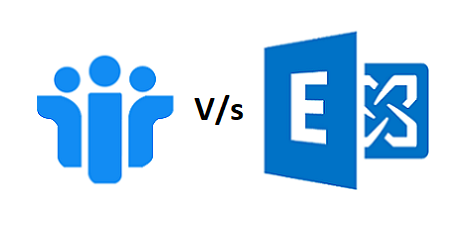Understand the Difference between Lotus Domino and Exchange Server
Determining the best mail server or group ware between Lotus Domino and Exchange Server is a very complicated task. It is so because both email clients have similar goals and both applications allow users to exchange information via emailing. However, they are greatly different in the approach of delivering email messages. Thus, to avoid the confusion of users, we have come up with this editorial. Here, we will discuss the difference between Lotus Domino and Exchange Server. Let us start with a general introduction to both email applications.
Introduction to Lotus Domino and Exchange Server
Lotus Domino is a business collaboration application that is developed by IBM to host the critical tasks, emailing, and workflow. It provides high network and database security features to administer critical business operations. Lotus Domino can be utilized as a Web server for Lotus Notes application.
Exchange Server is a widely used Mail Server, Contact Manager plus Calendaring software that is developed by Microsoft Corporation. This email client offers high business-class messaging with enhanced security and scheduling features. It allows users to access their data any time from any smart device.
Lotus Domino vs Exchange Server: Chart Comparison
| Characteristics | Lotus Domino | Exchange Server |
|
Directory |
Notes Address Book (NAB) | Active Directory (AD) |
| Notes Remote Procedure Call (NRPC) / Replication | Web service based or Public Folder | |
| MDB generated on Directory Catalog (DC) server | OAB generated on the mailbox server | |
| A replica put into user’s home server | CAS server copies OAB from MBX server and sends to the user | |
| Local Contacts | Local Contacts | |
| Mobile Directory (MDB) | Offline Address Book (OAB) | |
| Notes Client >> dconfing >> Home Server Policy | Outlook CachedMode >> Auto Discover >> CAS | |
| Recent Contacts | Suggested contacts | |
| Type Ahead | Auto-complete | |
|
Mail Routing |
Person’s PAB data/ information | Based on Exchange properties in Person’s AD account |
| NNN based | AD site based | |
| Notes Router | Hub Role | |
| NRPC for inter Domino plus SMTP for internet | Default protocol for SMTP | |
| Foreign SMTP Domain, SMTP Connection document, and SMTP listener | Send and Receive Connectors | |
| Global Domain and Aliases | Accepted Domains | |
| Implicit intra-organization send connector | Server having same NNN | |
| AD site link for inter-site | Connect docs/NNN for inter | |
| Link cost | Connect doc cost | |
|
Deleted Items / DB Recovery |
Trash | Deleted Items |
| Admin Approval / Recover from Backup | Soft Delete / Disconnected Database | |
| Recover from backup | Recover Deleted items | |
| Recover from backup | Purges (Single Item Recovery) | |
| Recover from backup | Litigation Hold / Recover from Backup | |
|
Search |
Column Vise | Column Vise |
| Domain indexing for file system files / Domain Database in a single place | Discovery mailboxes search for all the mailboxes of the organization | |
| Advance Search (Field based) | Advance Search (Property based) | |
| Server FT Index / Local FT search | Exchange Search / Windows Search | |
| Attachment indexing based on Filters | Attachment indexing based on Key View Filters | |
|
User Management |
Lotus Notes Admin Client | AD Users, Computers, and EMC |
| Third-party tools / Live Console | EMS | |
| Scripts | Scripts | |
| AdminP Requests | New_Requests (Move) | |
|
Clients |
Lotus Notes Client (NRPC) | Outlook (MAPI and RPC) |
| Inotes (HTTP) | OWA (HTTP) | |
| IMAP | IMAP | |
| POP3 | POP3 | |
| Traveler | Active Sync | |
| BES | BES | |
| Domino | Web Services Inbuilt | |
|
Offline Mode |
Offline | Outlook Cached Mode / Offline Mode |
| Local mail.nsf File | Local Outlook.pst file | |
| Archive.nsf | Archive.pst | |
| MobileDir and Local Contacts | OAB and Local Contacts | |
| Access Delegation | Reader Access | Full access to the mailbox (Open MBX in Outlook) |
After doing a deep analysis, we conclude that Exchange Server gains more popularity rather than Lotus Notes. Thus, if you are a Lotus Notes user and wish to export Lotus Notes to Exchange then, you are required to take help from a third-party tool as there is no any manual method to do so. Thus, we recommend to use SysTools Mail Migration Wizard to transfer Lotus Notes data to Exchange Server.
Concluding Lines
What is the difference between Lotus Domino and Exchange Server, is one of the most asked queries of computer users. In order to clear the confusion between these two email clients, we have compared their features on the basis of their performance and availability.




